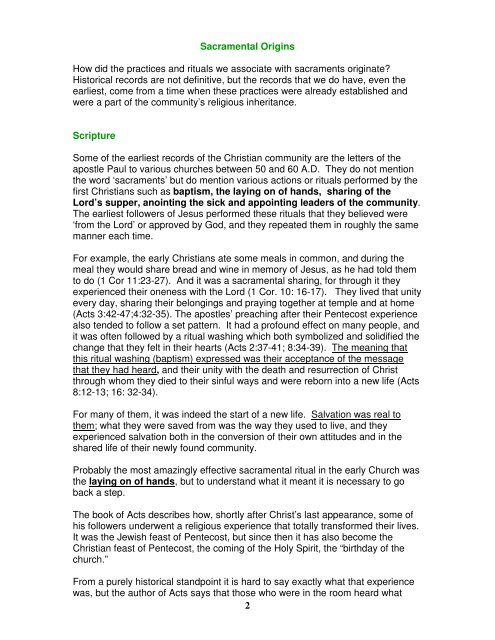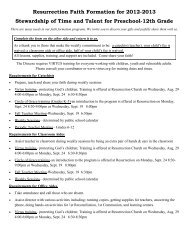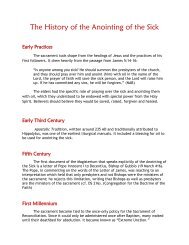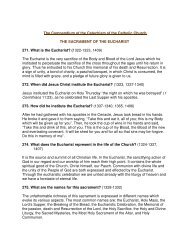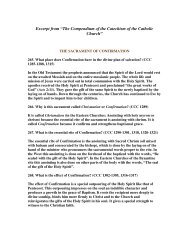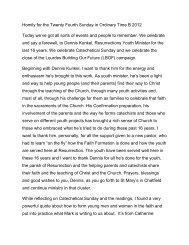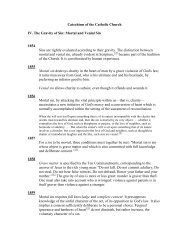2 Sacramental Origins How did the practices and rituals we ...
2 Sacramental Origins How did the practices and rituals we ...
2 Sacramental Origins How did the practices and rituals we ...
You also want an ePaper? Increase the reach of your titles
YUMPU automatically turns print PDFs into web optimized ePapers that Google loves.
<strong>Sacramental</strong> <strong>Origins</strong><br />
<strong>How</strong> <strong>did</strong> <strong>the</strong> <strong>practices</strong> <strong>and</strong> <strong>rituals</strong> <strong>we</strong> associate with sacraments originate?<br />
Historical records are not definitive, but <strong>the</strong> records that <strong>we</strong> do have, even <strong>the</strong><br />
earliest, come from a time when <strong>the</strong>se <strong>practices</strong> <strong>we</strong>re already established <strong>and</strong><br />
<strong>we</strong>re a part of <strong>the</strong> community’s religious inheritance.<br />
Scripture<br />
Some of <strong>the</strong> earliest records of <strong>the</strong> Christian community are <strong>the</strong> letters of <strong>the</strong><br />
apostle Paul to various churches bet<strong>we</strong>en 50 <strong>and</strong> 60 A.D. They do not mention<br />
<strong>the</strong> word ‘sacraments’ but do mention various actions or <strong>rituals</strong> performed by <strong>the</strong><br />
first Christians such as baptism, <strong>the</strong> laying on of h<strong>and</strong>s, sharing of <strong>the</strong><br />
Lord’s supper, anointing <strong>the</strong> sick <strong>and</strong> appointing leaders of <strong>the</strong> community.<br />
The earliest follo<strong>we</strong>rs of Jesus performed <strong>the</strong>se <strong>rituals</strong> that <strong>the</strong>y believed <strong>we</strong>re<br />
‘from <strong>the</strong> Lord’ or approved by God, <strong>and</strong> <strong>the</strong>y repeated <strong>the</strong>m in roughly <strong>the</strong> same<br />
manner each time.<br />
For example, <strong>the</strong> early Christians ate some meals in common, <strong>and</strong> during <strong>the</strong><br />
meal <strong>the</strong>y would share bread <strong>and</strong> wine in memory of Jesus, as he had told <strong>the</strong>m<br />
to do (1 Cor 11:23-27). And it was a sacramental sharing, for through it <strong>the</strong>y<br />
experienced <strong>the</strong>ir oneness with <strong>the</strong> Lord (1 Cor. 10: 16-17). They lived that unity<br />
every day, sharing <strong>the</strong>ir belongings <strong>and</strong> praying toge<strong>the</strong>r at temple <strong>and</strong> at home<br />
(Acts 3:42-47;4:32-35). The apostles’ preaching after <strong>the</strong>ir Pentecost experience<br />
also tended to follow a set pattern. It had a profound effect on many people, <strong>and</strong><br />
it was often follo<strong>we</strong>d by a ritual washing which both symbolized <strong>and</strong> solidified <strong>the</strong><br />
change that <strong>the</strong>y felt in <strong>the</strong>ir hearts (Acts 2:37-41; 8:34-39). The meaning that<br />
this ritual washing (baptism) expressed was <strong>the</strong>ir acceptance of <strong>the</strong> message<br />
that <strong>the</strong>y had heard, <strong>and</strong> <strong>the</strong>ir unity with <strong>the</strong> death <strong>and</strong> resurrection of Christ<br />
through whom <strong>the</strong>y died to <strong>the</strong>ir sinful ways <strong>and</strong> <strong>we</strong>re reborn into a new life (Acts<br />
8:12-13; 16: 32-34).<br />
For many of <strong>the</strong>m, it was indeed <strong>the</strong> start of a new life. Salvation was real to<br />
<strong>the</strong>m; what <strong>the</strong>y <strong>we</strong>re saved from was <strong>the</strong> way <strong>the</strong>y used to live, <strong>and</strong> <strong>the</strong>y<br />
experienced salvation both in <strong>the</strong> conversion of <strong>the</strong>ir own attitudes <strong>and</strong> in <strong>the</strong><br />
shared life of <strong>the</strong>ir newly found community.<br />
Probably <strong>the</strong> most amazingly effective sacramental ritual in <strong>the</strong> early Church was<br />
<strong>the</strong> laying on of h<strong>and</strong>s, but to underst<strong>and</strong> what it meant it is necessary to go<br />
back a step.<br />
The book of Acts describes how, shortly after Christ’s last appearance, some of<br />
his follo<strong>we</strong>rs under<strong>we</strong>nt a religious experience that totally transformed <strong>the</strong>ir lives.<br />
It was <strong>the</strong> Jewish feast of Pentecost, but since <strong>the</strong>n it has also become <strong>the</strong><br />
Christian feast of Pentecost, <strong>the</strong> coming of <strong>the</strong> Holy Spirit, <strong>the</strong> “birthday of <strong>the</strong><br />
church.”<br />
From a purely historical st<strong>and</strong>point it is hard to say exactly what that experience<br />
was, but <strong>the</strong> author of Acts says that those who <strong>we</strong>re in <strong>the</strong> room heard what<br />
2
sounded like a strong wind, <strong>and</strong> <strong>the</strong>n something like tongues of fire appeared<br />
over each of <strong>the</strong>ir heads. Suddenly <strong>the</strong>y felt <strong>the</strong>mselves changed inwardly, filled<br />
as it <strong>we</strong>re with a new spirit, that same spirit with which Jesus had been filled.<br />
They believed it was <strong>the</strong> spirit of God. And from <strong>the</strong>ir viewpoint, what else could<br />
it be? What human po<strong>we</strong>r could fill <strong>the</strong>m with such exuberance, such hope, such<br />
courage in <strong>the</strong> face of what <strong>the</strong>y saw happen to <strong>the</strong>ir master? What human<br />
po<strong>we</strong>r could make <strong>the</strong>m start uttering what <strong>the</strong>y felt in languages <strong>the</strong>y had never<br />
heard before?<br />
What was even more astonishing to <strong>the</strong>m was that <strong>the</strong>y could bring that<br />
spirit to o<strong>the</strong>rs. They began to tell o<strong>the</strong>rs <strong>the</strong>ir good news about Jesus, <strong>and</strong><br />
after <strong>the</strong> listeners would accept Jesus as Lord <strong>and</strong> be baptized in his name, <strong>the</strong>y<br />
would lay <strong>the</strong>ir h<strong>and</strong>s on <strong>the</strong>m <strong>and</strong> ask <strong>the</strong> Holy Spirit to fill those persons as<br />
<strong>we</strong>ll. The converts would <strong>the</strong>n have an experience of being filled with a new<br />
spirit, <strong>and</strong> sometimes even begin to praise God in strange languages. Usually<br />
this imposition of h<strong>and</strong>s would take place immediately after baptism.<br />
Undoubtedly, it was a sacramental action, for it was a symbol of something that<br />
could not be seen, of <strong>the</strong> spirit’s being “poured forth” upon <strong>the</strong> converts. And it<br />
was an effective symbol, for its effects could be seen in <strong>the</strong>ir behavior, as <strong>we</strong>ll as<br />
felt by <strong>the</strong>m personally. The meaning that it expressed was <strong>the</strong> imparting of <strong>the</strong><br />
Holy Spirit, <strong>the</strong> spirit of love, joy, peace, patience, kindness, goodness,<br />
faithfulness, gentleness, <strong>and</strong> self-control (Gal 5:22-23).<br />
It was <strong>the</strong> ‘confirmation’ of <strong>the</strong>ir acceptance by God, for <strong>the</strong> Fa<strong>the</strong>r gave <strong>the</strong>m <strong>the</strong><br />
same interior spirit that he had given to his son, Jesus.<br />
The Word “Sacrament”<br />
The term ‘sacrament’ comes from <strong>the</strong> Latin word sacramentum. In Roman times,<br />
it meant an oath of allegiance made by soldiers to <strong>the</strong>ir comm<strong>and</strong>er <strong>and</strong> <strong>the</strong> gods<br />
of Rome which involved a religious ceremony in a sacred place. Tertullian, a<br />
Christian writer in <strong>the</strong> second century, borro<strong>we</strong>d <strong>the</strong> term <strong>and</strong> used it to talk to his<br />
Roman contemporaries about <strong>the</strong> ceremony of Christian initiation.<br />
He explained that baptism was something like <strong>the</strong> sacramentum administered to<br />
new recruits—it was a ritual through which people began a new life of service to<br />
God.<br />
He would actually watch soldiers in boot camp. As <strong>the</strong> training was<br />
completed, Caesar would ga<strong>the</strong>r <strong>the</strong>m all toge<strong>the</strong>r <strong>and</strong> ask <strong>the</strong>m to take<br />
an oath, a sacramentum. “Vow to me, in good times <strong>and</strong> bad, in<br />
sickness <strong>and</strong> in health, your allegiance.” They would respond, “Caesar,<br />
<strong>we</strong> will be loyal soldiers to you, even to death for you. We will go to<br />
war for you…etc.” Once <strong>the</strong>y made this oath, <strong>the</strong>y <strong>we</strong>re br<strong>and</strong>ed as<br />
soldiers of Caesar <strong>and</strong> <strong>the</strong>re was no way out. Except death. The vow<br />
was for life. Tertullian borro<strong>we</strong>d <strong>the</strong> term <strong>and</strong> concept from Roman<br />
military practice when he was examining what Christians <strong>we</strong>re doing in<br />
<strong>the</strong> waters of death <strong>and</strong> enlightenment.<br />
Augustine - A Visible Sign of Invisible Grace<br />
3
By <strong>the</strong> fifth century, any sacred symbol or ceremony could be called a<br />
sacrament. Although <strong>the</strong> word was still used primarily in regard to <strong>the</strong> ceremony<br />
of initiation, it could also be applied to blessings, liturgical feasts, <strong>and</strong> holy<br />
objects. Augustine defined sacrament as “a sign of a sacred reality,” a “visible<br />
sign of invisible grace,” “an outward sign instituted by Christ to give grace.” He<br />
noted that according to this general definition anything in <strong>the</strong> world could be<br />
considered a sacrament since all of creation was a sign of God.<br />
By <strong>the</strong> t<strong>we</strong>lfth century, Christian usage became more restricted <strong>and</strong> was applied<br />
only to <strong>the</strong> seven church <strong>rituals</strong> known to Catholics as <strong>the</strong> sacraments. After<br />
<strong>the</strong> sixteenth century <strong>the</strong> use of <strong>the</strong> word was restricted still fur<strong>the</strong>r by those<br />
Protestants who limited <strong>the</strong> number of sacraments to fe<strong>we</strong>r than seven.<br />
The Baltimore Catechism definition, “an outward sign instituted by Christ to give<br />
grace” comes from Augustine <strong>and</strong> <strong>the</strong> definition still works fairly <strong>we</strong>ll. <strong>How</strong>ever,<br />
with our rene<strong>we</strong>d <strong>the</strong>ology <strong>and</strong> reformed liturgical rites, it just doesn’t go far<br />
enough. Today <strong>we</strong> have come to see sacraments in a much broader sense. We<br />
have come to see <strong>the</strong>m more like Augustine saw <strong>the</strong>m.<br />
The actual historical process of sacramental experience <strong>and</strong> <strong>the</strong>ology has not<br />
been a neat <strong>and</strong> simple straight-line development. There have been dead ends,<br />
radical turning points, backtracking, <strong>and</strong> even some going around in circles.<br />
Change<br />
It is difficult to trace with precision how <strong>the</strong> Church, acting under <strong>the</strong> direction of<br />
<strong>the</strong> Holy Spirit, elaborated <strong>the</strong> present sacramental <strong>rituals</strong> <strong>and</strong> beliefs. But by <strong>the</strong><br />
early t<strong>we</strong>ntieth century, it was generally accepted that many of <strong>the</strong> Roman<br />
church’s sacramental beliefs <strong>and</strong> <strong>practices</strong> had indeed changed through <strong>the</strong><br />
years.<br />
Changed <strong>practices</strong> presented little difficulty. Catholics believed <strong>the</strong> church was<br />
entitled to adapt forms of worship to <strong>the</strong> customs of different people, provided<br />
that nothing essential was altered. And changed teachings could be understood<br />
as doctrinal development. Catholics believed that <strong>the</strong> church, under <strong>the</strong><br />
guidance of <strong>the</strong> Holy Spirit, was becoming more aware of <strong>the</strong> fullness of divine<br />
revelation. So what was perhaps only implicit in scripture could in <strong>the</strong> course of<br />
time become an explicit part of <strong>the</strong> church’s doctrines. In short, doctrinal<br />
development was considered to be an evolution from less perfect to more<br />
perfect, with <strong>the</strong> Catholic Church finally arriving at <strong>the</strong> best underst<strong>and</strong>ing of <strong>the</strong><br />
sacraments with <strong>the</strong> pronouncements of <strong>the</strong> Council of Trent (16 th c.)—<strong>the</strong> norm<br />
for sacraments for subsequent centuries.<br />
The Broader Perspective of Sacraments<br />
And development goes on. Not long ago, <strong>the</strong> Catholic underst<strong>and</strong>ing of <strong>the</strong> word<br />
“sacrament” referred exclusively to seven liturgical rites. Since <strong>the</strong> Second<br />
Vatican Council (1960s), ho<strong>we</strong>ver, Catholic <strong>the</strong>ologians have exp<strong>and</strong>ed <strong>the</strong><br />
4
meaning of <strong>the</strong> term. In <strong>the</strong> broad sense, a sacramental experience is an<br />
encounter with God through human experience which somehow changes us.<br />
And virtually any human experience can provide us with such an encounter.<br />
The Old Testament is full of sacramental events touching <strong>the</strong> lives of <strong>the</strong> Hebrew<br />
people long before <strong>the</strong> Church defined or categorized sacraments, e.g., <strong>the</strong> dove<br />
returning to Noah carrying an olive branch, <strong>the</strong> flood, <strong>and</strong> Creation. Through <strong>the</strong><br />
Exodus event (escape of <strong>the</strong> Israelites from slavery in Egypt), <strong>the</strong>y came to<br />
recognize Yah<strong>we</strong>h in an entirely new way, <strong>and</strong> <strong>the</strong>ir whole history was altered.<br />
As a result, <strong>the</strong>y told <strong>and</strong> retold <strong>the</strong> story, not just in words but in symbols <strong>and</strong><br />
actions through <strong>the</strong>ir Passover ritual.<br />
Christian Sacraments<br />
“What was visible in <strong>the</strong> Lord has passed over into <strong>the</strong> sacraments.”<br />
Pope Leo <strong>the</strong> Great (440-61 AD)<br />
The Church’s seven ritual sacraments come from Jesus’ life <strong>and</strong> actions, <strong>and</strong> his<br />
values <strong>and</strong> teachings. He transformed those actions (baptism, breading bread,)<br />
<strong>and</strong> <strong>the</strong> ordinary human values (forgiveness, concern for <strong>the</strong> sick, marriage <strong>and</strong><br />
service) into spiritual values by helping people see God’s love made visible<br />
through <strong>the</strong> living of those values. Their encounter with Jesus changed <strong>the</strong>m,<br />
<strong>and</strong> <strong>the</strong>y shared <strong>the</strong> story of that transformation (like <strong>the</strong> Hebrews), not just with<br />
words <strong>and</strong> stories, but with symbolic action.<br />
They told <strong>the</strong> story of Jesus, but also lived it. Like Jesus, <strong>the</strong>y <strong>we</strong>nt into <strong>the</strong><br />
waters of Baptism to symbolize <strong>the</strong>ir new life. They broke bread <strong>and</strong> shared it as<br />
a symbol of God’s love <strong>and</strong> care for <strong>the</strong>m, <strong>and</strong> <strong>the</strong>ir love <strong>and</strong> care for each o<strong>the</strong>r.<br />
They prayed for each o<strong>the</strong>r, laid h<strong>and</strong>s on each o<strong>the</strong>r, healed <strong>and</strong> forgave—just<br />
as <strong>the</strong>y had seen Jesus break bread, lay h<strong>and</strong>s on, heal <strong>and</strong> forgive.<br />
Thus <strong>the</strong> Church’s seven sacraments <strong>we</strong>re born, even though <strong>the</strong>y may not yet<br />
have been enumerated or named. Out of that birth comes <strong>the</strong> beginning of <strong>the</strong><br />
definition with which most of us grew up.<br />
Definition of Sacrament Unpacked<br />
1) “A sacrament is an outward sign” – a SIGN points out from itself to<br />
something else. E.g., a red light means stop, it has one single meaning <strong>and</strong><br />
usually an arbitrary one.<br />
But sacraments are more than “outward signs,” <strong>the</strong>y are SYMBOLS which have<br />
multiple meanings which point into <strong>the</strong>mselves, into <strong>the</strong>ir own depth to<br />
express what cannot be expressed in any o<strong>the</strong>r way. They bring us in touch with<br />
<strong>the</strong> familiar <strong>and</strong> mysterious simultaneously.<br />
For example, a <strong>we</strong>dding ring is a symbol with multilayered meanings, e.g. it<br />
indicates <strong>the</strong> person <strong>we</strong>aring it is not single; it is also symbolic of <strong>the</strong> mystery of<br />
love bet<strong>we</strong>en two people who become symbols for o<strong>the</strong>rs of <strong>the</strong> mystery of <strong>the</strong><br />
love God has for his people. Similarly <strong>the</strong> waters of Baptism symbolize life <strong>and</strong><br />
death, washing <strong>and</strong> cleansing, <strong>and</strong> <strong>the</strong> mystery of new life out of death. The<br />
bread <strong>and</strong> wine of Eucharist are symbolic of God’s care, nourishment, love,<br />
5
nurture <strong>and</strong> sacrifice for us; <strong>and</strong> of our care, sharing, love, nurture, nourishment<br />
<strong>and</strong> sacrifice for one ano<strong>the</strong>r.<br />
Catholic Christians should never think of <strong>the</strong> seven sacraments as apart from life.<br />
All must be appreciated as peak moments that heighten <strong>and</strong> celebrate <strong>the</strong><br />
sacramentality of life in <strong>the</strong> world. Note that all <strong>the</strong> sacraments are symbolized<br />
by <strong>the</strong> “ordinary” of life, by bread, wine, water, oil, touch, words, gestures, <strong>and</strong><br />
lovemaking in marriage. Each symbolizes something profoundly everyday that<br />
by <strong>the</strong> po<strong>we</strong>r of God’s Spirit continues <strong>the</strong> saving mission of Jesus, enacting a<br />
peak moment in <strong>the</strong> divine-human partnership. As <strong>the</strong>ologian Rosemary<br />
Haughton writes, “Sacraments are extraordinary experiences of <strong>the</strong> ordinary.”<br />
2) “Instituted by Christ.” Jesus <strong>did</strong>n’t walk along with <strong>the</strong> disciples <strong>and</strong> say,<br />
“Aha, I’ll call it Baptism, Confirmation, Matrimony…<strong>and</strong> <strong>the</strong> outward signs will be<br />
oil….water….rings, etc. The sacraments arise out of <strong>the</strong> story of Jesus’ life <strong>and</strong><br />
actions, <strong>and</strong> flow from his values <strong>and</strong> teachings. He allo<strong>we</strong>d himself to be<br />
baptized, <strong>and</strong> he broke bread <strong>and</strong> shared it—out of those special events come<br />
Baptism <strong>and</strong> Eucharist. He saw very basic values <strong>and</strong> experiences (forgiveness,<br />
concern for <strong>the</strong> sick, marriage, service) <strong>and</strong> he transformed those ordinary<br />
human values into spiritual values by helping people see God’s love made visible<br />
through <strong>the</strong> living of those values.<br />
So while sacraments <strong>we</strong>re not necessarily set forth in every detail by Jesus, <strong>the</strong>y<br />
<strong>we</strong>re instituted by him because, clearly, <strong>the</strong>y come from him. As <strong>we</strong> celebrate<br />
<strong>the</strong> sacraments, Jesus is present to us as he was to <strong>the</strong> early Church. In Jesus<br />
<strong>we</strong> encounter God’s presence. Jesus is <strong>the</strong> one great sacrament through which<br />
all o<strong>the</strong>r sacraments make sense.<br />
3) “To give grace.” Most of us grew up with <strong>the</strong> notion that <strong>the</strong> sacraments<br />
provided us with something called grace which <strong>we</strong> <strong>we</strong>re somehow lacking. But<br />
grace (<strong>the</strong> self-gift of God) is already <strong>the</strong>re. Because it is always present, it<br />
frequently goes unnoticed. A sacrament makes grace present for you by<br />
bringing it to your attention, by allowing you to see it. It mediates God’s grace<br />
with heightened effect. Each sacrament is a way of meeting Christ <strong>and</strong> receiving<br />
<strong>the</strong> particular grace it symbolizes, be that of initiating, empo<strong>we</strong>ring, sustaining,<br />
forgiving, healing, serving or bonding.<br />
As with any gift, <strong>the</strong> gift of grace, totally free <strong>and</strong> ever present, is ours to accept<br />
or reject. Our acceptance of grace in our lives is what <strong>we</strong> express <strong>and</strong> celebrate<br />
in <strong>the</strong> sacraments.<br />
Sacraments <strong>and</strong> <strong>the</strong> Christian Community<br />
Sacraments happen not simply to individuals. They can be understood<br />
completely only in relation to <strong>the</strong> Body of Christ, which is <strong>the</strong> Church. This is why<br />
<strong>the</strong> new rites insist that <strong>the</strong> sacraments be celebrated in <strong>the</strong> Christian assembly,<br />
with <strong>the</strong> community present <strong>and</strong> actively participating. The richness <strong>and</strong><br />
6
effectiveness of <strong>the</strong> symbolism often depends on our degree of participation <strong>and</strong><br />
responsiveness.<br />
Sacraments nei<strong>the</strong>r begin nor end with liturgical celebration. They begin with<br />
God’s love <strong>and</strong> care through Christ to us, <strong>the</strong> Church. They continue with us, <strong>the</strong><br />
Church, <strong>and</strong> so long as <strong>we</strong> continue to live <strong>and</strong> enact God’s love <strong>and</strong> care in <strong>the</strong><br />
world—<strong>the</strong>y never end.<br />
References:<br />
Martos, J. Doors to <strong>the</strong> Sacred. St. Louis: Liguori Publications, 2001.<br />
DeGidio, S<strong>and</strong>ra. “The Seven Sacraments—Symbols of God’s Care.” Catholic Update. 1991.<br />
Himes, Michael J. Doing <strong>the</strong> Truth in Love. Mahwah: Paulist Press. 1995.<br />
Groom, T. What Makes Us Catholic. San Francisco: Harper Collins Publishers, Inc. 2002.<br />
7


